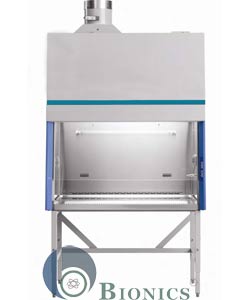What Might Be Next In The Class 2 Biosafety Cabinets
What Might Be Next In The Class 2 Biosafety Cabinets
Blog Article
Class 2 Biosafety Cabinets: Essential Equipment for Laboratory Safety and Microbiological Containment

Maintaining a safe lab environment is crucial in today’s advanced research and clinical setups. Whether it's handling live pathogens or sensitive diagnostics, biosafety cabinets are central to preventing cross-contamination and safeguarding personnel.
Of all types, Class 2 cabinets are most commonly used due to their efficiency and versatility. These units are essential for labs working with infectious materials or clinical diagnostics.
Overview of Biosafety Cabinets in Laboratory Environments
Biosafety cabinets are ventilated enclosures built to protect both users and biological materials. They use advanced filters to trap harmful particles before air re-enters the lab.
These units are generally classified into Classes I, II, and III depending on airflow and application needs. Among these, Class 2 cabinets are the most versatile and commonly used.
What Are Class 2 Biosafety Cabinets?
Class 2 Biosafety Cabinets are designed to safeguard three aspects: the operator, the sample, and the environment. They utilise downward laminar airflow within a sealed system.
Contaminated air is drawn into the cabinet and filtered through HEPA systems before recirculation or exhaust. These cabinets are frequently used in labs handling infectious agents or clinical samples.
What Makes Class 2 Cabinets Effective in Labs
A Class 2 microbiological safety cabinet includes several critical technologies such as:
• Medical-grade filters for capturing contaminants
• Laminar airflow that minimises disruption and contamination
• Inward airflow to keep aerosols contained
• Optional UV lights for overnight sterilisation
• Low sound emissions to reduce fatigue
• Transparent sash or viewing window for easy access and monitoring
These elements ensure safety, comfort, and efficiency in day-to-day lab tasks.
Where Class 2 Cabinets Are Used
Class 2 Biosafety Cabinets are widely deployed in clinical labs, vaccine R&D, and academic research. They are indispensable for handling clinical specimens, blood cultures, and biological reagents.
Whether in hospitals or drug manufacturing, these units are essential for clean procedures.
Why Laboratories Prefer Class II Safety Cabinets
Using Class 2 cabinets offers multiple advantages including operator protection and experimental reliability:
• Prevents contamination during sensitive procedures
• Shields operators from harmful aerosols and pathogens
• Minimises lab contamination and pollution risks
These cabinets support biosafety goals while improving lab productivity.
Cabinet Types and Global Compliance
Top manufacturers ensure their cabinets meet certifications like NSF 49, EN 12469, and WHO recommendations. Class 2 units are sub-classified as A1, A2, B1, and B2—based on varying airflow balance and ducting needs.
• Type A2: Ideal for general-purpose labs
• Type B2: Used for hazardous vapors and chemicals
Matching the cabinet type to your process is essential.
Tips for Purchasing the Ideal Biosafety Cabinet
Before purchasing, consider:
• The types of agents and materials handled
• Ventilation compatibility and placement
• Operational costs and technical support options
• Service network and part availability
Working with reliable manufacturers provides peace of mind and technical guidance.
Safe Setup and Operation of Class 2 Cabinets
For optimal results:
• Install the cabinet in a Biosafety Cabinets draft-free, low-traffic zone
• Schedule regular performance checks
• Educate staff on cabinet operations and safety
Operational best practices include:
• Always wear appropriate lab PPE
• Minimise hand movements inside the cabinet
• Wipe work areas with disinfectants regularly
• Use UV lights only when cabinet is off and unoccupied
Final Thoughts on Class 2 Biosafety Cabinets
Class 2 biosafety cabinets are essential for labs that value safety, precision, and cleanliness. They ensure contamination-free experiments and personnel safety.
From pathology labs to advanced genetic testing, Class II cabinets support world-class laboratory practices. When investing in a biosafety cabinet, prioritise compliance, usability, and long-term support—because lab safety is non-negotiable. Report this page